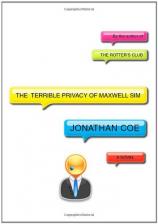Reading Group Guide
Discussion Questions
The Terrible Privacy of Maxwell Sim

1. On a superficial level, The Terrible Privacy of Maxwell Sim is about a depressed, recently divorced, middle-aged customer relations representative who take a leave of absence and then becomes a toothbrush salesman --- hardly an irresistible premise for a novel. How does Coe manage to take such inauspicious circumstances and spin from them such a brilliant fictional work? What are the larger themes that emerge from the novel?
2. Early in the novel, after Max has confessed that he’s not very good at describing people, he admits: “I am not very good at describing clothes either --- are you looking forward to the next three hundred pages?” [p. 5]. What is the effect of this kind of self-conscious disclosure --- of Max addressing the reader directly and admitting that he is writing this book?
3. When Max tells people his name, he explains, depending on the age of the person he’s speaking to, that his last name is Sim --- like the SIM (Subscriber Identity Module) memory card in a cell phone or like the game that allows users to create a simulated city complete with simulated citizens, or Sims. Why would Coe have chosen this name for his protagonist?
4. The novel is titled The Terrible Privacy of Maxwell Sim and yet Max himself claims that these is “no such thing as privacy anymore. We were never really alone” [p. 60]. In what ways is Max both alone and not alone, robbed of privacy and at the same time a victim of it?
5. Over dinner in a restaurant, both Max and his daughter Lucy are more absorbed in sending and receiving text messages than they are in each other’s company, which prompts Max to remember the wonderful intimacy he’d observed between the woman and her daughter. What is the novel saying about the role of new technologies such as BlackBerrys, SatNavs, cell phones, Facebook, etc., in our lives?
6. The novel is filled with surprises --- sudden turnings, strange coincidences, stunning revelations. What are some of the most startling moments in the book? How do these create narrative tension and draw the reader on?
7. Max is both a narrator and a reader in the novel, as the story he is telling contains several other stories within it --- Caroline’s short story “The Nettle Pit,” Alison’s essay “The Folded Photograph,” and Max’s father’s memoir “The Rising Sun.” What does Max learn about himself through reading these narratives? What do they add to the overall structure of the novel?
8. Just before Caroline leaves Max, she says “How can anybody like a man who doesn’t even like himself?” [p. 11]. What is the source of Max’s inability to accept and to like himself? Does he come to greater self-acceptance by the end of the novel? In what ways do his struggles mirror those of his father?
9. Why does Max identify so strongly with Crowhurst? What are the consequences of this obsessive identification?
10. Discussing his complicated scheme to make money out of nothing, Roger Anstruther tells Max’s father: “Don’t become one of those lesser mortals who inhabits the material world. The world where people spend their lives making things and then buying and selling and using and consuming them. The world of objects. That’s for the hoi polloi, not the likes of you and me. We’re above all that. We’re alchemists” [p. 244–5]. In what ways do Roger’s exhortations here embody the Masters of the Universe ethos of the financial wizards who nearly destroyed the world economy in 2008? What are the dangers inherent is wishing to live “above” the the material world?
11. Max recalls the quote by E. M Forster “Only connect,” and reflects that the highways in Great Britain seem to have been designed to fulfill the opposite injunction: Only disconnect. In what ways does the novel dramatize the disconnection of modern life?
12. Why does Max feel so comforted by “Emma,” the voice of his Toyota's Satellite Navigation system? In what ways is his “relationship” with her genuinely healing for him?
13. The Terrible Privacy of Maxwell Sim is both heartbreaking and hilarious. What are some of the funniest moments in the book? What are some of the saddest moments?
14. What does the novel as a whole say about the emotional costs of repressing one’s sexual identity?
15. The Terrible Privacy of Maxwell Sim, though it is an emotionally powerful realistic narrative, could be described as meta-fiction. How surprising is the novel’s remarkable ending? In what ways does the ending force the reader to rethink all that has come before?
The Terrible Privacy of Maxwell Sim
- Publication Date: March 8, 2011
- Genres: Fiction
- Hardcover: 336 pages
- Publisher: Knopf
- ISBN-10: 0307594815
- ISBN-13: 9780307594815








